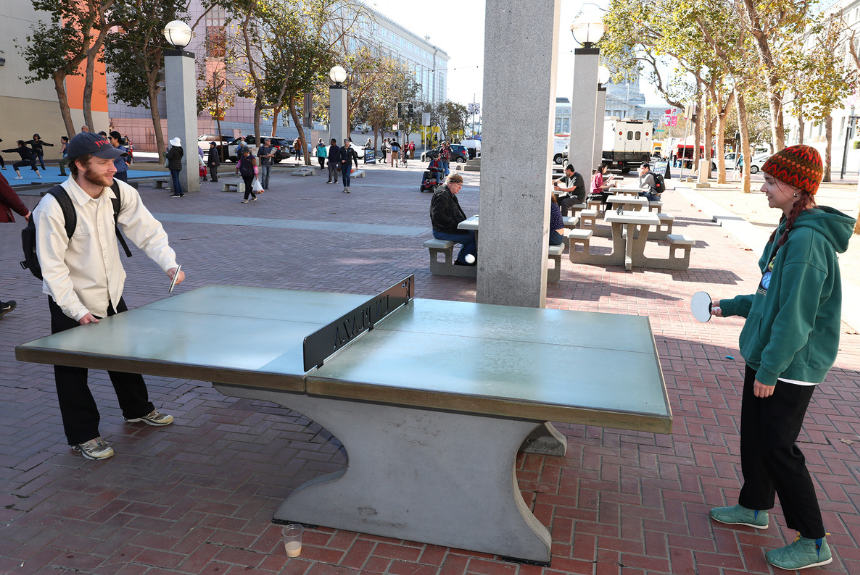Modern Problems Require Modern Solutions
Redefining Public Park Spaces to Include the Public Again
Public parks have always been intended as spaces of relaxation, recreation, and community. But in recent years, many parks across the U.S. have struggled under the weight of modern urban challenges—homelessness, drug use, loitering, and disuse. These complex social issues require not just compassion, but creativity. And two very different parks—one in the heart of San Francisco, the other in small-town Roseburg, Oregon—are proving that thoughtful design and playful infrastructure can help reclaim public space for the people.
U.N. Plaza: From National Embarrassment to National Example
Not long ago, San Francisco’s United Nations Plaza was infamous for all the wrong reasons. Located just a block from City Hall and a major transit hub, the plaza had become a grim focal point for open-air drug markets, homelessness, and public health emergencies. But rather than wall off the space or chase the symptoms, the City chose a more human-centered approach.
Through a $2 million revitalization effort—supported by San Francisco Recreation and Park Department and led by Verde Design—U.N. Plaza was transformed into an active, inclusive public square. New amenities included a skate plaza, outdoor fitness equipment, and game areas with concrete ping pong and foosball tables, as well as chessboards and cornhole. These changes didn’t just alter the landscape—they shifted the energy.
Since reopening in November 2023, the plaza has welcomed over 340,000 visitors and seen a dramatic 78% drop in daytime drug-related incidents. The presence of skateboarders, families, and casual players using the concrete games has helped replace despair with daily engagement. As skateboarding legend Tony Hawk’s recent visit underscored, a space once avoided is now nationally recognized—with U.N. Plaza winning the 2024 California Parks and Recreation Society Award of Excellence in Facility Design.
Read More About U.N. Plaza and the revitalization of public spaces using concrete games and other amenities to attract more vitality.

Eagles Park: A Small-Town Turnaround
On the other end of the spectrum sits Eagles Park in downtown Roseburg, Oregon. A modest quarter-acre lot near shops and new college housing, Eagles Park was often overlooked and underused—until a new spark arrived in the form of heavy-duty concrete play.
Thanks to a collaboration between the City of Roseburg, nonprofit Thrive Umpqua, and family-owned Stone Age Concrete Games, the park received a donation of a 2,400-pound concrete ping pong table and two 400-pound cornhole boards. These rugged, weatherproof installations quickly became anchors of activity.
The transformation was more than physical—it was cultural. Students from the nearby UCC dorms began using the park. Community members gathered on Thursday evenings for friendly competition. A Facebook page popped up to coordinate play. The additions were also a heartfelt memorial: the ping pong table honors the late Bobby Troup, a beloved local tennis pro and ping pong enthusiast who helped cultivate Roseburg’s underground table tennis scene.
Eagles Park still faces the same challenges of homelessness and loitering as many downtown parks—but during open hours, it now also sees laughter, competition, and community. It’s no longer just a green patch with a bench. It’s a place people want to be.
Concrete Games, Lasting Impact
At Stone Age Concrete Games, we believe in more than just manufacturing tables—we believe in building moments. Whether in a big-city plaza or a small community park, permanent, accessible games create gathering points that are resilient, low-maintenance, and deeply human. These installations offer something many public spaces are missing: a reason to engage, to stay, to play.
Redefining our public parks starts with a simple truth: people come back to places that make them feel welcome. Whether it's the thrill of a foosball rally, the precision of a cornhole toss, or the joy of ping pong under the sun, play invites presence. And presence pushes out neglect.
Modern problems are real—but so are modern solutions. We’re proud to be part of a growing movement that proves play isn't just fun—it’s foundational.
Content Sources N.Y. Times, Roseburg City Connection, San Francisco Parks and Recreation Website.